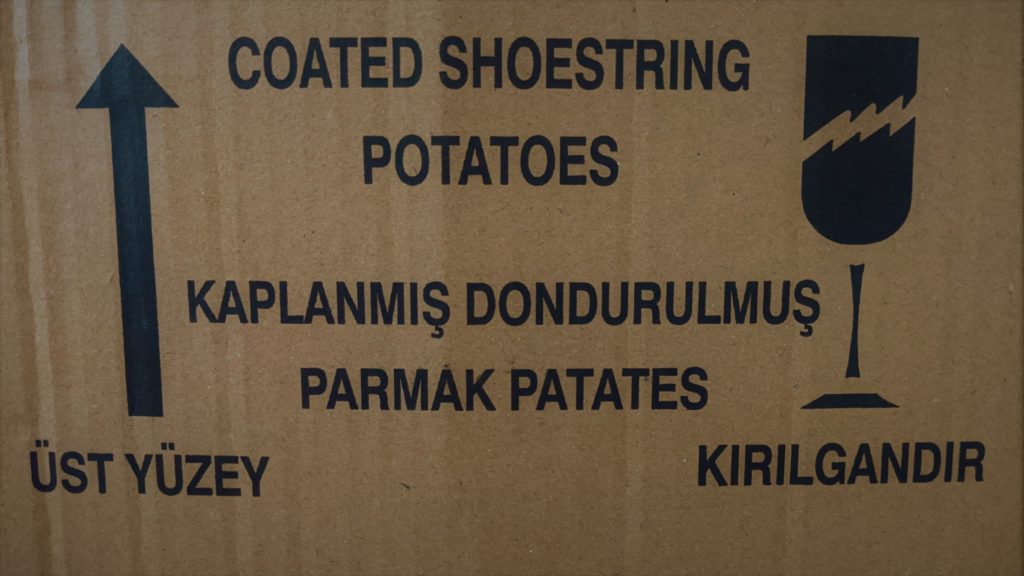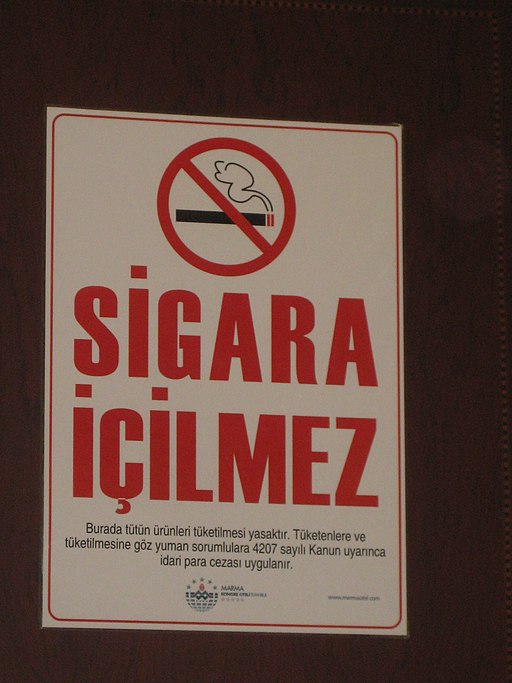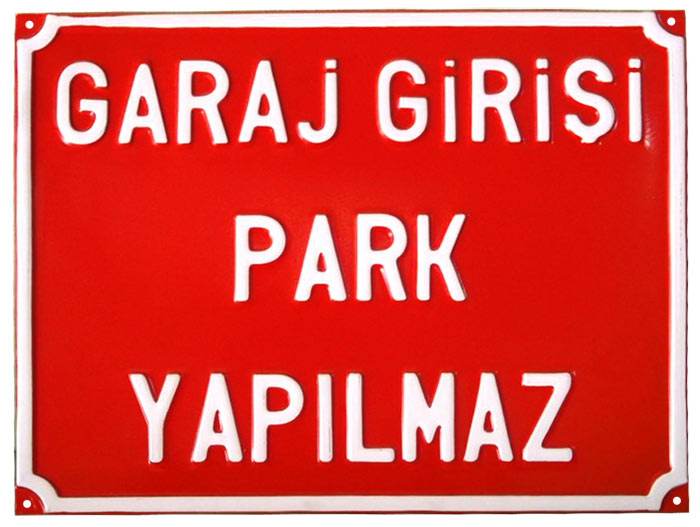Log in or register to save completed lessons.
Prerequisites for this Turkish Grammar Lesson
Past tense verbs-dı/di/du/dü or -tı/ti/tu/tü
Asking yes or no questions
-mış
The passive voice in Turkish
In most languages, there is a way of making sentences using the passive voice. In passive sentences, the grammatical subject of the sentence is the person, place or thing that has an action done to it. This is different from active sentences, where the subject is usually the one doing the action. An example of a passive sentence in English is, “he was given a gift.”
Two passive endings: ‑ıl and ‑(ı)n
Grammar form:
- Verb stem + ıl/il/ul/ül + other word endings
- Verb stem + n/ın/in/un/ün + other word endings
In the Turkish language, there are two ways to form passive sentences. You either use the passive ‑ıl/il/ul/ül ending or you use the ‑n/ın/in/un/ün ending. The ‑(ı)n ending was originally the reflexive ending, but it used with a passive meaning on some words where the ‑ıl ending cannot be added for phonological reasons. In other words, Turkish speakers a long time ago apparently did not like how the ‑ıl ending sounded on the end of some words, so they used the ‑(ı)n ending instead.
Phonological rules for choosing between ‑ıl and ‑(ı)n
With many verbs, you can use both the ‑ıl and the ‑(ı)n ending. For some verbs, however, you can only use one or the other of them. Here are the rules for determining which ending you can use:
- If the verb stem ends in a vowel, you have to use the ‑n ending.
- If the verb stem ends in the letter l, you have to use the ‑ın ending.
- If the verb stem ends in the letter n, you have to use the ‑ıl ending.
On words where there is no phonological restriction (verb stems ending in a consonant other than l or n), it is much more common to use the ‑ıl ending than the ‑(ı)n ending.
But don’t worry about remembering all these rules when you are first starting to learn about passives. For most Turkish learners, it is easier to take each verb one at a time, treating the passive form of each verb as a new vocab word to learn and practice. To get you started, here are some examples of passive forms of some of the most common verbs.
Common verbs that only use the ‑ıl passive ending
| Base verb | With ‑ıl ending |
| Açmak (to open) | Açılmak (to be opened) |
| Atmak (to throw) | Atılmak (to be thrown) |
| Beğenmak (to like) | Beğenilmek (to be liked) |
| Bozmak (to break) | Bozulmak (to be broken) |
| Çözmek (to solve) | Çözülmek (to be solved) |
| Duymak (to hear) | Duyulmak (to be heard) |
| Getirmek (to bring) | Getirilmek (to be brought) |
| Gitmek (to go) | Gidilmek (to be gone to) |
| Göndermek (to send) | Gönderilmek (to be sent) |
| Göstermek (to show) | Gösterilmek (to be shown) |
| Götürmek (to take somewhere) | Götürülmek (to be taken somewhere) |
| Hissetmek (to feel) | Hissedilmek (to be felt) |
| Kaldırmak (to remove) | Kaldırılmak (to be removed) |
| Kesmek (to cut) | Kesilmek (to be cut) |
| Konuşmak (to talk) | Konuşulmak (to be talked about) |
| Korkmak (to fear) | Korkulmak (to be feared) |
| Kurmak (to build) | Kurulmak (to be built) |
| Sanmak (to assume) | Sanılmak (to be assumed) |
| Satmak (to sell) | Satılmak (to be sold) |
| Seçmek (to choose) | Seçilmek (to be chosen) |
| Sevmek (to love) | Sevilmek (to be loved) |
| Sıkmak (to squeeze, to bore) | Sıkılmak (to be squeezed, to be bored) |
| Sormak (to ask) | Sorulmak (to be asked) |
| Takmak (to hang, to attach) | Takılmak (to be hung, to be attached) |
| Ulaşmak (to arrive) | Ulaşılmak (to be arrived at) |
| Unutmak (to forget) | Unutulmak (to be forgotten) |
| Vermek (to give) | Verilmek (to be given) |
| Vurmak (to hit) | Vurulmak (to be hit) |
| Yapmak (to do, to make) | Yapılmak (to be done, to be made) |
| Yazmak (to write) | Yazılmak (to be written) |
| Yormak (to tire) | Yorulmak (to be tired) |
Common verbs that only use the ‑(ı)n passive ending
| Base verb | With ‑(ı)n ending |
| Almak (to take) | Alınmak (to be taken) |
| Aramak (to search) | Aranmak (to be looked for) |
| Başlamak (to start) | Başlanmak (to be started) |
| Beklemek (to wait) | Beklenmek (to be waited for) |
| Bilmek (to know) | Bilinmek (to be known) |
| Bölmek (to divide) | Bölünmek (to be divided) |
| Boyamak (to paint) | Boyanmak (to be painted) |
| Bulmak (to find) | Bulunmak (to be found) |
| Çalmak (to steal, to play an instrument) | Çalınmak (to be stolen, to be played) |
| Harcamak (to spend) | Harcanmak (to be spent) |
| İstemek (to want) | İstenmek (to be wanted) |
| İzlemek (to watch) | İzlenmek (to be watched) |
| Korumak (to protect) | Korunmak (to be protected) |
| Kutlamak (to celebrate) | Kutlanmak (to be celebrated) |
| Okumak (to read) | Okunmak (to be read) |
| Oynamak (to play) | Oynanmak (to be played) |
| Ödemek (to pay) | Ödenmek (to be paid for) |
| Silmek (to erase) | Silinmek (to be erased) |
| Taşımak (to haul) | Taşınmak (to be hauled, to move) |
| Yakalamak (to catch) | Yakalanmak (to be caught) |
Real life examples of passive ‑ıl and ‑(ı)n endings
Here are some examples of passive verb forms that you will find commonly as you go about your everyday life. Passive forms are especially common on product labels.
Eleman aranıyor.
Now hiring (literally, “employee is searched for”)
(Common sign posted in shop windows)
Kaplanmış dondurulmuş parmak patates
Coated, frozen french fries
Haşlanmış börülce
Boiled black eyed peas
Kızartılmış kaju fıstığı
Roasted cashew nuts
Hazır kesilmiş pişirme kağıdı
Ready-cut baking paper
Kurutulmuş domates aromalı ve fesleğenli patates cipsi
Dried tomato-flavored and basil-spiced potato chips
Yağı azaltılmış bitkisel margarin
Reduced fat vegetable margarine (lit., vegetable margarine that has had its fat reduced)
Indirect commands
Sometimes Turkish passive sentences are used as indirect commands. This is most common in formal Turkish writing, such as in official warning signs.
Sigara içilmez
No smoking (literally, “cigarettes are not smoked”)
(Common sign posted in public places)
Yasak bölge ‑ girilmez
Restricted area ‑ do not enter (literally, “it is not entered”)
(Common sign posted outside property owned by military)
Garaj girişi ‑ park yapılmaz
Garage entry ‑ no parking (literally, “parking is not done”)
(Common sign posted outside private residences)
More example sentences
Margarin nasıl yapılır?
How is margarine made?
(Title of a blog post)
PTT personel alımı ne zaman yapılacak? PTT yazılı sınavda neler soruluyor?
When will PTT (post office) personnel be recruited? What is asked in the PTT written exam?
(From a news story)
Kayıt için hangi belgeler isteniyor?
What documents are required for registration?
(From an informational page on an organization’s website)
Berberin telefonu bozuldu.
The barber’s phone broke (literally, “got broken”)
(From the title of a YouTube video)
Specifying the agent (the person doing the action) in a passive sentence
In linguistic terms, the person who performs the action of a sentence is called the semantic agent. In most cases, you use a passive form of a verb in order to place emphasis on the recipient of an action as opposed to the person performing the action. A lot of times you do this if the person doing the action is not relevant or not known. For this reason, passive sentences usually omit the semantic agent.
However, in some cases it is useful to specify the agent of a passive sentence. This is especially common in formal speech and legal writing.
In English, we specify the semantic agent using the word “by” (as in, “a gift was given to me by my parents”). In Turkish, there are two ways do this. You can either add the word “tarafından” after the person doing the action or you can add the ‑ca/ce/ça/çe ending to them.
Grammar form
- (Agent) + ca/ce/ça/çe (verb in passive form)
- (Agent) tarafından (verb in passive form)
Example passive sentences with the agent specified
Genlerimiz dünyaya başka varlıklar tarafından getirildi.
Our genes were brought to the world by other beings.
(Title of a post about aliens)
Çırağan Sarayı nerede, ne zaman ve kim tarafından yapıldı?
Where, when and by whom was the Çırağan Palace made?
(Title of post on news website)
Kargom şubeden başka kişi tarafından alınıyor.
My package gets taken from the cargo office by another person.
(From a customer’s complaint)
Ödüllerin miktarı, her yıl Maliye Bakanlığı ile Bakanlıkça birlikte tespit edilir.
The amount of the awards is determined each year by the Ministry of Finance and the Ministry [of Culture and Tourism].
(Excerpt from a piece of legislation)
Yeni ruhsat sahibi şirkete Genel Müdürlükçe üç aylık süre verilir.
The new license holding company is given a period of three months by the General Directorate.
(Excerpt from a piece of legislation)
Alıç ve kızılcıklar köylülerce toplanıyor.
Haws and cornel berries are being harvested by the villagers.
(From the title of a news story)
Kâr dağıtım politikaları genel müdürce önerilir.
Profit distribution policies are proposed by the general manager.
(Excerpt from academic paper)
Askıya çıkış ve iniş muhtarca onaylanır.
Suspensions and reinstatements are approved by the Mukhtar.
(Excerpt from news story)
Exceptions: special rules for certain verbs
There are a lot of exceptions when it comes to using the passive form with different verbs in Turkish. Here are some of the types of exceptions that you will encounter as you are learning the passive forms of new verbs.
Dropping vowels before adding ‑ıl
There are a few verbs in Turkish that drop vowels before adding the passive ‑ıl ending. This is fairly rare and seems to only happen with verb stems that end in the letter “r.”
Verbs that drop vowels with ‑ıl
| Base verb | With ‑ıl ending |
| Çevirmek (to flip, to translate) | Çevrilmek (to be flipped, translated) |
| Devirmek (to knock over) | Devrilmek (to be knocked over) |
| Ayırmak (to separate) | Ayrılmak (to be separated) |
| Buyurmak (to decree) | Buyrulmak (to be decreed) |
| Çağırmak (to call) | Çağrılmak (to be called) |
Using ‑(ı)n and ‑ıl with a reflexive meaning (doing something to yourself)
Besides the passive usage, the ‑(ı)n and ‑ıl endings can also be used on some verbs with a reflexive meaning. That is, adding these endings sometimes gives the meaning of doing an action to oneself. This typically happens with the ‑(ı)n ending, but in some cases it can happen with the ‑ıl ending as well.
Verbs with reflexive ‑(ı)n endings
| Base verb | With reflexive ‑(ı)n ending |
| Örtmek (to cover) | Örtünmek (to cover oneself) |
| Giymek (to wear) | Giyinmek (to dress oneself) |
| Yıkamak (to wash) | Yıkanmak (to wash oneself) |
| Saklamak (to hide something) | Saklanmak (to hide oneself) |
| Uzamak (to exend) | Uzanmak (to lie down, to stretch oneself out) |
| Eğmek (to bend something) | Eğilmek (to bend over) |
| Çekmek (to pull) | Çekilmek (to withdraw oneself) |
| Sarmak (to wrap) | Sarılmak (to hug ‑ literally to wrap oneself) |
Adding ‑(ı)n or ‑ıl without changing the meaning
For a handful of verbs in Turkish, you can add the ‑(ı)n ending to the base verb without changing the meaning of the verb in any significant way.
Verbs with meaningless ‑(ı)n or ‑ıl endings
| Base verb | With ‑(ı)n ending |
| Ürkmek (to be startled) | Ürkülmek (to be startled) |
| Avlamak (to hunt) | Avlanmak (to hunt) |
| Tapmak (to worship) | Tapınmak (to worship) |
Miscellaneous meanings of the ‑(ı)n ending
For some verbs in Turkish, you can add the ‑(ı)n ending to the base verb to create a new verb that is only marginally related to the base verb.
Examples of verbs with unusual ‑(ı)n meanings
| Base verb | With ‑(ı)n ending |
| Kalkmak (to rise) | Kalkınmak (to develop) |
| Görmek (to see) | Görünmek (to appear) |
| Sürmek (to spread) | Sürünmek (to crawl) |
Verbs that can use either ‑ın or ‑ıl
For some verbs, you can use either the ‑ın or the ‑ıl passive form. This happens with some of the verbs with stems that end in a consonant other than “n” or “l.”
In these cases, the form that uses the ‑ıl ending is typically the passive version of the verb that you would expect it to be. The ‑ın form, on the other hand, has a slightly different meaning. The precise meaning of ‑ın in these cases is not predictable: you simply have to learn what it means for each new word you learn.
Examples of words with both endings
| With ‑ıl ending | With ‑ın ending |
| Görülmek (to be seen) | Görünmek (to appear a certain way) |
| Tutulmak (to be held) | Tutunmak (to hold on) |
| Çekilmek (to be pulled, to retreat) | Çekinmek (to hesitate) |
| Sürülmek (to be spread, driven) | Sürünmek (to crawl) |
| Bakılmak (to be looked at, looked after) | Bakınmak (to look around) |
| Giyilmek (to be worn) | Giyinmek (to get dressed) |
| Geçilmek (to be passed) | Geçinmek (to earn a living) |
| Kaçılmak (to be escaped from) | Kaçınmak (to be avoided) |
| Sevilmek (to be loved) | Sevinmek (to rejoice) |
| Edilmek (to be done, to be made) | Edinmek (to obtain) |
Ambiguity in passive verb forms
For some Turkish verbs, you can use the same ending ending with different meanings in different contexts. Ambiguity is more common with the ‑(ı)n ending than with the ‑ıl ending.
Examples of passive verbs with multiple meanings
| Passive verb | Passive meaning | Alternate meaning |
| Yıkanmak | To be washed | To bathe |
| Temizlenmek | To be cleaned | To clean oneself |
| Saklanmak | To be hidden | To hide |
| Toplanmak | To be picked up, gathered | To gather for a meeting |
| Söylenmek | To be said | To grumble |
| Korunmak | To be protected | To defend oneself |
| Kaşınmak | To itch | To scratch (oneself) |
| Avlanmak | To be hunted | To hunt |
| Dayanmak | To lean on | To resist, to endure |
| Kapanmak | To be closed | To close oneself off |
| Sallanmak | To be swung | To swing |
| Aranmak | To be looked for | (For a location) to be searched |
| Sorulmak | (For a question) to be asked | (For a person) to be asked |
| Yaşanmak | (For an event) to be experienced | (For a place) to be lived in |
Passives with obsolete base verbs
There are some verbs that have a passive ending, but the base verb is not used in modern Turkish. This can happen when the base verb becomes obsolete over time and a different verb replaces it in common usage. Because the original base verb for some of these words went out of use a long time ago, some of the original meanings are not known for sure.
One example of a word that is starting to become obsolete is “kapamak” (to close). The passive is “kapanmak,” but the base form is not as commonly used. It is being replaced by the causative form, “kapatmak” (“to close,” or literally, “to cause to close”).
For some of these examples, we can see evidence of an older usage of the ‑(ı)n ending. In this older usage, the ‑(ı)n ending has a meaning of “taking” or “obtaining,” a meaning that is still present in the verb “edinmek” (to obtain).
Examples of passive verbs without a non-passive version
| Passive verb | English meaning | Original meaning |
| Evlenmek | To get married | To obtain a house |
| Kullanmak | To use | To obtain a slave |
| Dinlenmak | To rest | To take a breath |
| Düşünmek | To think | To have a dream |
| Ayaklanmak | To protest | To take feet |
| Öğrenmek | To learn | To make oneself accustomed |
| Dirilmek | To be resurrected | To come alive |
| Bayılmak | To faint | To become weakened |
| Kurtulmak | To be saved | To be made lucky |
| Yanmak | To burn | To be burned |
| Uyanmak | To wake up | To be awoken |
Adding both passive endings: ‑(ı)nıl
For some verbs, you can add both the ‑(ı)n ending and the ‑ıl ending to a verb at the same time. In these cases, the ‑(ı)n ending always goes before the ‑ıl ending.
In some cases, adding ‑(ı)nıl is essentially the same as adding a single passive ending. This is the case for “yemek,” “demek,” and “söylemek.”
For some verbs where there is a non-standard meaning of the ‑(ı)n ending, adding the ‑ıl ending is simply the passive version of this non-standard meaning. An example of this is “edinilmek,” which is the passive version of “edinmek” (to obtain).
In most cases, though, adding ‑(ı)nıl makes an impersonal passive sentence. In other words, you aren’t saying that an action is being done by someone specific, but that an action is done in general. You can also use a single passive ending with the impersonal passive meaning, but adding the ‑(ı)nıl ending makes it clearer that the meaning is impersonal passive.
Examples of double passive endings
| Base verb | Verb with ‑(ı)nıl ending |
| Kaçmak (to escape) | Kaçınılmak (to be avoided) |
| Yemek (to eat) | Yenilmek (to be eaten) |
| Demek (to say) | Denilmek (to be said) |
| Söylemek (to say) | Söylenilmek (to be said) |
| Etmek (to make, to do) | Edinilmek (to be obtained) |
| Yaşamak (to live) | Yaşanılmak (to be lived) |
This lesson is a prerequisite for:
Story: Sleeping on the RoofŞimdi damda üç tane halam var. Onlar damda yatacaklar. Akşam, böyle… yaz akşamı. Dedim ki ben de geleceğim...
Babam akşam yemek saatine kural koyardı, bizde. Sofra serildiği zaman, akşam yemeğine oturulduğu zaman bir kuralı vardı. Derdi…
Şimdi normalde mesela şey var, hani Adana deprem bölgesi olduğu için, deprem bölgesinde yani yerli yersiz zamanlarda...










